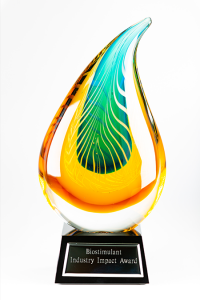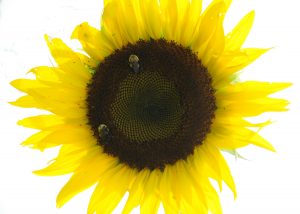This short, 3-minute video provides a virtual tour of the BHN corporate headquarters in Gilbert, Arizona, along with a look at our Mesa Verde Humates mine in New Mexico.
8 Simple Steps to Healthy Crop Soil
BHN Earns 2019 Biostimulant Industry Impact Award
 Bio Huma Netics, Inc. (BHN), located in Gilbert, Arizona, is the recipient of the 2019 Biostimulant Industry Impact Award. The award was presented at Biostimulant CommerceCon in Atlantic City, New Jersey, by AgriBusiness Global and its parent company, Meister Media Worldwide. This prestigious annual award is given to the company that a panel has judged to have best leveraged biostimulant product innovation, successfully implemented a distribution strategy, and implemented a change-making marketing and communications campaign. The prize awarded includes an integrated media package valued at $25,000 USD. [Read more…]
Bio Huma Netics, Inc. (BHN), located in Gilbert, Arizona, is the recipient of the 2019 Biostimulant Industry Impact Award. The award was presented at Biostimulant CommerceCon in Atlantic City, New Jersey, by AgriBusiness Global and its parent company, Meister Media Worldwide. This prestigious annual award is given to the company that a panel has judged to have best leveraged biostimulant product innovation, successfully implemented a distribution strategy, and implemented a change-making marketing and communications campaign. The prize awarded includes an integrated media package valued at $25,000 USD. [Read more…]
BHN Hires Dr. Mojtaba Zaifnejad to Oversee Agricultural Research
 Bio Huma Netics, Inc. (BHN), has hired Mojtaba Zaifnejad, PhD, to be Senior Director of Field Research and Technical Services. In this position he will oversee the company’s agricultural product-use research and field trials for its Huma Gro® and Fertilgold® Organics soil health, crop nutrition, and crop protection brand lines. He will also provide technical support to the sales team and to company clients. [Read more…]
Bio Huma Netics, Inc. (BHN), has hired Mojtaba Zaifnejad, PhD, to be Senior Director of Field Research and Technical Services. In this position he will oversee the company’s agricultural product-use research and field trials for its Huma Gro® and Fertilgold® Organics soil health, crop nutrition, and crop protection brand lines. He will also provide technical support to the sales team and to company clients. [Read more…]
BHN Launches “The Huma Gro Farmer” Podcast
 Bio Huma Netics, Inc. (BHN), has launched a new podcast series titled The Huma Gro Farmer. The podcast features episodes on how to “grow healthy”—featuring interviews with industry leaders on specific agriculture-related topics, how to use Huma Gro® products for superior results, and best practices for using product combinations for specific crops (early podcast episodes focused on strawberries).
Bio Huma Netics, Inc. (BHN), has launched a new podcast series titled The Huma Gro Farmer. The podcast features episodes on how to “grow healthy”—featuring interviews with industry leaders on specific agriculture-related topics, how to use Huma Gro® products for superior results, and best practices for using product combinations for specific crops (early podcast episodes focused on strawberries).
BHN VP of Marketing Ray Speakman said, “We’re really excited about this podcast series; it’s been a dream for us to have a platform like this where real people can help us tell the Huma Gro® story in interesting ways. Reaction to the initial episodes has been very positive, and we look forward to having a long run with this series. Episode story ideas have been coming in pretty fast, and we encourage people to leave comments and suggestions on the podcast archive page.”
The Huma Gro Farmer can be subscribed to from Apple i-Tunes, Google Podcasts, Stitcher, Spotify, and other major podcasting platforms. An episodes archive, along with subscription options, can be found on the Huma Gro® Website at https://humagro.com/podcasts/.
Fertilgold® Organics Earns OMRI-Listing for 24 Initial Products
Fertilgold® Organics, a brand of organic fertilizer products from Bio Huma Netics, Inc. (BHN) headquartered in Gilbert, Ariz., has achieved Organic Materials Review Institute (OMRI) listing for 24 initial products. Of these, 18 OMRI-listed liquid crop nutrition products are based on the company’s proprietary nutrient carrier, Micro Carbon Technology®, which carries nutrients to plants more effectively than traditional organic nutrition products.
OMRI-Listed Fertilgold® Organics products currently include:
Fertilgold® Soil (liquid: nitrogen, iron, manganese, zinc)
Fertilgold® N-5.5 (liquid: nitrogen)
Fertilgold® NK (liquid: nitrogen and potassium)
Fertilgold® K-6 (liquid: potassium)
Fertilgold® 3-2-5 (liquid: nitrogen, phosphorus, potassium)
Fertilgold® B (liquid: boron)
Fertilgold® Ca (liquid: calcium)
Fertilgold® Co (liquid: cobalt)
Fertilgold® Cu (liquid: copper)
Fertilgold® Fe (liquid: iron)
Fertilgold® Mg (liquid: magnesium)
Fertilgold® Mn (liquid: manganese)
Fertilgold® Mo (liquid: molybdenum)
Fertilgold® MoN (liquid: molybdenum, nitrogen)
Fertilgold® Zn (liquid: zinc)
Fertilgold® Micros I (liquid: a balanced mix of S, B, Cu, Fe, Mn, Mo, and Zn)
Fertilgold® MicroHumic® (dry: humic/fulvic acid)
Fertilgold® Powder (dry: humic/fulvic acid)
Fertilgold® Greens (dry: humic/fulvic acid)
Fertilgold® 1–3 mm (dry: humic/fulvic acid)
Fertilgold® K Hume (dry: humic/fulvic acid)
Fertilgold® 6 mm(-) (dry: humic/fulvic acid)
Fertilgold® Double Play™ (liquid: soil-applied fungicide and nematicide)
Fertilgold® Triple Play™ (liquid: foliar-applied insecticide, miticide, fungicide)
These products are currently available for sale to commercial organic growers in select states (check availability at https://fertilgold.com/shop/), and they will soon be registered and available throughout the United States and in several other countries. Additional products that are currently undergoing review for OMRI listing are in the categories of Soil Fertility, Macronutrients, Liquid Humic and Fulvic Acids, Biopesticides, and Surfactants.
Lyndon Smith, BHN President and CEO, stated, “For years, customers of our bestselling Huma Gro® crop nutrition and protection product line for conventional farming have been asking us to develop a fully organic product line that is also powered by our Micro Carbon Technology®. The folks on our product development team have done an outstanding job with creating the Fertilgold® Organics products, which we think will redefine organic crop nutrition. We are offering a full line of effective products that have been designed to deliver true organic nutrition exactly when, where, and how crops need it. Anyone familiar with the outstanding crop yield and quality results achieved by our Huma Gro® products on the conventional farming side is going to absolutely love what Fertilgold® Organics with Micro Carbon Technology® (for the liquid products) will do for their organic crops.”
More information is available on the Fertilgold® Organics Website (fertilgold.com), which will provide ongoing updates regarding new products, OMRI-Listed status for products, and state registration for each. Blog content will also flow out to followers on Fertilgold® Organics Facebook and Twitter social media channels.
Our Humic Advantage
Humic substances, among the most wondrous products of nature, are the recycled essential residues of life. Plants harvest the sun’s energy and create life from that energy plus the carbon and oxygen they pull out of the air and the minerals they pull out of the soil. When plants die, all of their components are decomposed through the aid of microorganisms and mineralization, then returned to the soil as organic matter. [Read more…]
BHN Welcomes Rich Lamar to the Humic Research Team

On May 1, 2019, Dr. Richard Lamar joined Bio Huma Netics, Inc. (BHN) as Senior Director of Humic Research. He brings a tremendous amount of skills, experience, and knowledge of humic substances to BHN.
Dr. Lamar has a B.S. in Biology from the University of Miami, an M.S. in Forestry from Mississippi State University, and a Ph.D. in Forestry from North Carolina State University, with minors in Chemistry, Plant Physiology, and Soils, respectively. He has many years’ experience as a scientist, and 22 years’ research experience in the biosolids and humic industries, including as a Research Director for the EarthFax Development Corporation. Dr. Lamar has collaborated on more than 50 publications and 3 patents for bioremediation methods and methods for quantitation of humic substances.
BHN Chief Executive Officer Lyndon Smith commented, “We are pleased to have Dr. Lamar leading the Humic Research Team for Bio Huma Netics’product lines. Along with extensive experience in soil bioremediation and pollution treatment technologies, he has in-depth knowledge of soil microbiology and an excellent understanding of humic and fulvic chemistry. In addition, Rich displays the professionalism and integrity that we value at BHN. With his background in agricultural and soil sciences, he will be an invaluable addition to our Research Team.”
The Bio Huma Netics crop nutrition and protection lines include more than 15 humic and fulvic acid products for restoring and enhancing soil fertility, and more than 150 products in the categories of macronutrients, micronutrients, soil fertility, growth managers, organic acids, and crop protection—all based on our proprietary Micro Carbon Technology®nutrient carrier that enables growers to accomplish more with less product.
About Bio Huma Netics, Inc.
Founded in 1973, Bio Huma Netics, Inc., (BHN) is a three-generation family- and employee-owned company that is a global leader in providing sustainable solutions to the world’s environmental challenges for conventional agriculture (HUMA GRO®, MESA VERDE HUMATES®); organic agriculture (FERTILGOLD®ORGANICS); horticulture, turf & ornamentals (HUMA GRO®TURF); and soil & wastewater remediation (PROBIOTIC SOLUTIONS®) all based on its proprietary Micro Carbon Technology®. Learn more at www.bhn.us.
Earth Day 2019: Protect the Pollinators
 The theme of this year’s 49th annual Earth Day on April 22 is “Protect Our Species.” One extremely important aspect of this theme to everyone involved in agriculture is protecting the world’s insect pollinators. The global crop production pollinated by bees is estimated to be valued at $577 billion. Pollinators contribute $24 billion to the U.S. agriculture industry, making up a third of the food consumed by Americans.
The theme of this year’s 49th annual Earth Day on April 22 is “Protect Our Species.” One extremely important aspect of this theme to everyone involved in agriculture is protecting the world’s insect pollinators. The global crop production pollinated by bees is estimated to be valued at $577 billion. Pollinators contribute $24 billion to the U.S. agriculture industry, making up a third of the food consumed by Americans.
Despite bees being considered a keystone species, not nearly enough is being done to preserve this essential contributor to our food production process. Worldwide bee populations are in decline, including the honey bee and many of our wild native bees. It is estimated that commercial honeybee populations in the U.S. have declined by as much as 40% since 2006.
There are many suspected contributors to bee decline, including:
- Widespread use of pesticides, particularly neonicotinoids that—once absorbed by plants—can be present in pollen and nectar
- Loss of habitat, including land use changes, habitat fragmentation, loss of bio-diversity
- Climate change
- Pests, diseases, viruses, and mold
The U.S. Department of Agriculture (USDA) Natural Resources Conservation Service (NRCS) offers advice on how farmers can help pollinators. Some of the principles advocated by the USDA include:
- Know the habitat on your farm. Look for areas on and around your land that can support native bees. Most native bees are solitary or live in small colonies. Bumble, digger, and sweat bees make up the bulk of pollen bees in most parts of the country.
- Protect flowering plants and nest sites. Once you know where bees are living and foraging, do what you can to protect these resources from disturbance and pesticides. Bees rely on an abundance and variety of flowers and need blooming plants throughout the growing season. Native plant species are particularly valuable.
- Enhance habitat with flowering plants and additional nest sites. Most bees love sun and prefer to nest in dry places. Nests are created underground, in twigs and debris, and in dead trees or branches. You can add flowers, leave some ground untilled, and provide bee blocks (tunnels drilled into wood) to increase the number of native bees on your farm.
- Minimize tillage. Many of our best crop pollinators live underground for most of the year, sometimes at the base of the very plants they pollinate. To protect them, turn over soil only where you need to. Allow crops to bolt. If possible, allow leafy crops like lettuce to flower if they need to be tilled right away. This gives bees additional food sources.
- Exercise Care with Insecticides. Most insecticides are deadly to bees, and unnecessary herbicide use can remove many of the flowers that they need for food. If you use insecticides, choose ingredients targeted to specific species (for example, Btk—Bacillus thuringiensis kurstaki— for pests such as leaf rollers) and the least harmful formulations (i.e., granules or solutions). Spray on calm, dry evenings, soon after dark when bees are not active. Keep in mind that even when crops are not in bloom, some of your best pollinators are visiting nearby flowers, where they may be killed by drifting chemicals.
More information is available at the USDA NRCS Website.
Information about Earth Day and how to protect bees is available on the Earth Day Network Website.
For those of you in the Phoenix area who would like to learn more about protecting pollinators, the University of Arizona Desert Institute of Gardening is holding a seminar from 6–8 pm this Thursday, April 25, at the Maricopa County Extension Office. Click here for details.
BHN’s Fertilgold® Organics Earns OMRI-Listing for 21 Products
 Fertilgold® Organics, a brand of organic fertilizer products from Bio Huma Netics, Inc. (BHN) headquartered in Gilbert, Ariz., has achieved Organic Materials Review Institute (OMRI) listing for 21 initial products. Of these, 13 OMRI-listed liquid crop nutrition products are based on the company’s proprietary nutrient carrier, Micro Carbon Technology®, which carries nutrients to plants more effectively than traditional organic nutrition products.
Fertilgold® Organics, a brand of organic fertilizer products from Bio Huma Netics, Inc. (BHN) headquartered in Gilbert, Ariz., has achieved Organic Materials Review Institute (OMRI) listing for 21 initial products. Of these, 13 OMRI-listed liquid crop nutrition products are based on the company’s proprietary nutrient carrier, Micro Carbon Technology®, which carries nutrients to plants more effectively than traditional organic nutrition products.
OMRI-Listed Fertilgold® Organics products currently include:
- Fertilgold® N-5.5 (liquid: nitrogen)
- Fertilgold® NK (liquid: nitrogen and potassium)
- Fertilgold® K-6 (liquid: potassium)
- Fertilgold® B (liquid: boron)
- Fertilgold® Ca (liquid: calcium)
- Fertilgold® Co (liquid: cobalt)
- Fertilgold® Cu (liquid: copper)
- Fertilgold® Fe (liquid: iron)
- Fertilgold® Mg (liquid: magnesium)
- Fertilgold® Mn (liquid: manganese)
- Fertilgold® Mo (liquid: molybdenum)
- Fertilgold® Zn (liquid: zinc)
- Fertilgold® Micros I (liquid: a balanced mix of S, B, Cu, Fe, Mn, Mo, and Zn)
- Fertilgold® MicroHumic® (dry: humic/fulvic acid)
- Fertilgold® Powder (dry: humic/fulvic acid)
- Fertilgold® Greens (dry: humic/fulvic acid)
- Fertilgold® 1–3 mm (dry: humic/fulvic acid)
- Fertilgold® K Hume (dry: humic/fulvic acid)
- Fertilgold® 6 mm(-) (dry: humic/fulvic acid)
- Fertilgold® Double Play™ (liquid: soil-applied fungicide and nematicide)
- Fertilgold® Triple Play™ (liquid: foliar-applied insecticide, miticide, fungicide)
These products are currently available for sale to commercial organic growers in select states (check availability at https://fertilgold.com/shop/), and they will soon be registered and available throughout the United States and in several other countries. Additional products that are currently undergoing review for OMRI listing are in the categories of Soil Fertility, Macronutrients, Liquid Humic and Fulvic Acids, Biopesticides, and Surfactants.
Lyndon Smith, BHN President and CEO, stated, “For years, customers of our bestselling Huma Gro® crop nutrition and protection product line for conventional farming have been asking us to develop a fully organic product line that is also powered by our Micro Carbon Technology®. The folks on our product development team have done an outstanding job with creating the Fertilgold® Organics products, which we think will redefine organic crop nutrition. We are offering a full line of effective products that have been designed to deliver true organic nutrition exactly when, where, and how crops need it. Anyone familiar with the outstanding crop yield and quality results achieved by our Huma Gro® products on the conventional farming side is going to absolutely love what Fertilgold® Organics with Micro Carbon Technology® (for the liquid products) will do for their organic crops.”
More information is available on the Fertilgold® Organics Website (fertilgold.com), which will provide ongoing updates regarding new products, OMRI-Listed status for products, and state registration for each. Blog content will also flow out to followers on Fertilgold® Organics Facebook and Twitter social media channels.